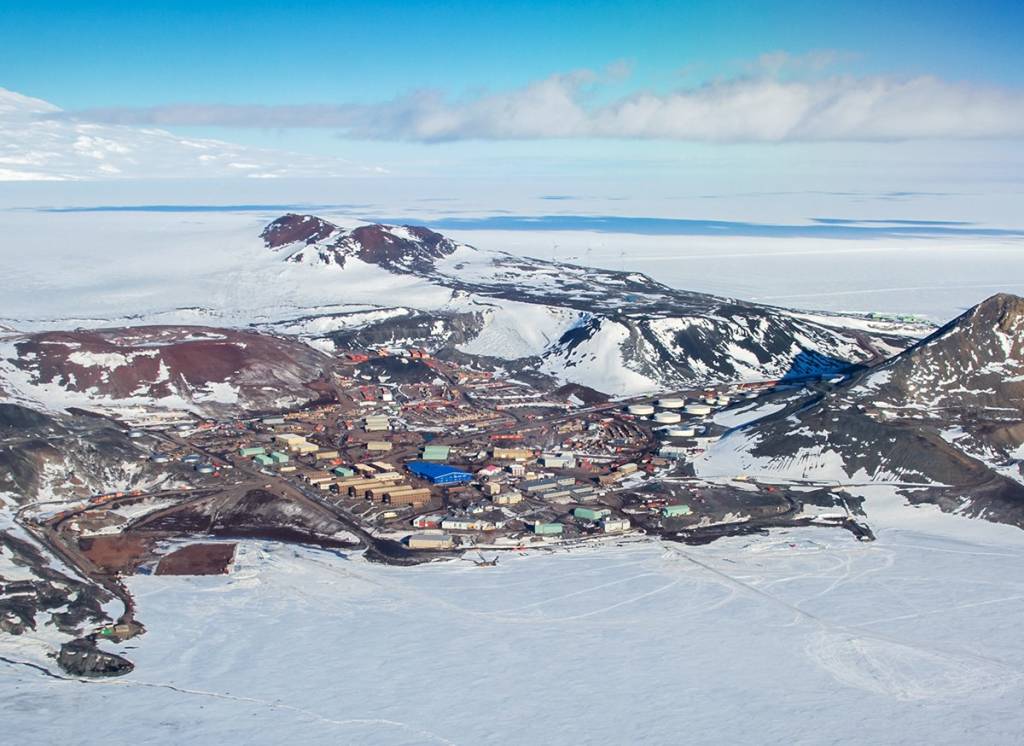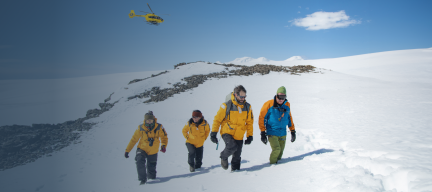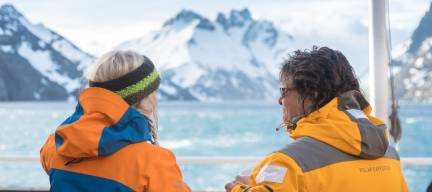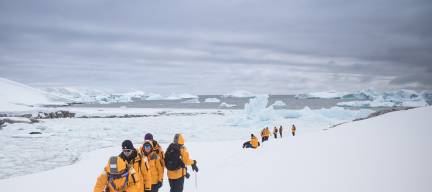8 Fun Facts About Antarctica

Emperor penguins are one of numerous species found in the Antarctic region. Photo: Sue Flood
Some surprising and fun facts about Antarctica:
• Based on the definition of a desert (which is determined by the amount of precipitation a region receives), Antarctica is officially a desert—but without the typical sand dunes and extremely hot temperatures.
•No one owns Antarctica. Unlike the Arctic, which is part of various nations such as Russia, Canada, Denmark (Greenland), and Norway, Antarctica is not part of any nation. There is no passport. There is not even a standard national currency.
•Most of the world’s freshwater is found in the Antarctic.
•Everywhere you look in Antarctica is north. You’ve probably read that when you stand at the North Pole, at 90 degrees North, at the very top of the world, every direction you look is south. Well, the reverse is true of the South Pole. When you’re in the farthest southern reaches of Antarctica, every direction you look is north!
• Antarctica is home to numerous active volcanoes.
• At least 9 species of penguins are found in the Antarctic region.
• It’s estimated that glacial ice covers 97.6 of Antarctica.
• Antarctica has no indigenous inhabitants. Short-term residents include the staff at various research stations.

McMurdo Research Station, on the tip of Ross Island, is home to a rotating contingent of researchers and polar scientists. Photo: AdobeStock
How to Get to Antarctica
Determining how to get to Antarctica is, naturally, the first step when you plan to travel to Antarctica. Because of its remoteness, the climate, the vast stretches of ice and land where no humans live (except for a few scientists, and the incredible wildlife), the best way to travel to Antarctica is with an experienced team of polar guides who have worked on multiple expeditions to the Antarctic region. Quark Expeditions has focused exclusively on polar travel since 1991. The expedition team undergoes rigorous training at Quark Academy, the only proprietary training facility of its kind in the Polar Regions. This team has the expertise and long-entrenched wisdom to know where to find wildlife, how to best navigate the fjords, oceans, bays, shore, tundra, and snow-covered landscapes of Antarctica. You cannot travel to the Antarctic with just any group of wildlife or adventure guides. It’s imperative you travel to Antarctica with an expedition team that is truly experienced in polar adventure in the Antarctic—both for your safety but also to ensure you maximize the expedition experience.

One way of getting to Antarctica is to fly across the 800-km Drake Passage, which, depending on the weather, is
either called Drake Lake or the Drake Shake. Photo: Dave Merron
Now, how do you actually get to Antarctica? The quickest answer: by polar vessel. Most visitors who go to Antarctica do so on a polar expedition ship with companies like Quark Expeditions, which operates dozens of voyages to the Antarctic region each season. Depending on where you live, you’ll quite likely fly by plane to the southern portion of South America, perhaps Buenos Aires or Punta Arenas, and from there you’ll be flown (usually) by charter plane to Ushuaia, the resort hub at the foot of Argentina, the southernmost tip of South America. From there you’ll board your polar vessel, cross the Drake Passage and start your Antarctic voyage.
It’s also possible to fly across the Drake Passage, which is particularly appealing if you’re strapped for time or simply don’t want to cross the 80-km Drake Passage by ship. Once you choose how to get to Antarctica, the next steps are relatively easy. Veteran polar guide Daven Hafey addresses these and other topics in his dedicated blog You Can Travel to Antarctica and Here’s How.
Why are there no Antarctic cities?
Climate. Terrain. Remoteness. Lack of natural resources. No government infrastructure (since Antarctica belongs to no one). The impossibility of practical (and easy) transportation from one place to another within the Antarctic means people and goods can’t move about easily, which is a key element in successful cities. Costliness. No available materials to build or support a city. The list is endless.

The rugged terrain, while conductive to wildlife habitat, largely prohibits construction of buildings. Photo: Nicky Souness
The real answer to why there are no Antarctic cities is fairly simple: It’s not really possible. There are small settlements and research with rotating populations of fewer than 100 per year (some much, much less). And most importantly: Why are there no Antarctic cities? Who’d want one? Who’d want to mess with the environment? Who’d dare put the already sensitive ecosystem in peril?
You will find a “modest” population in Stanley (previously called Port Stanley), the capital of the sub-Antarctic domain of the Falkland Islands. A British Overseas Territory (which Argentina also claims), the Falkland Islands, especially its capital of Stanley, has been described as “more British than Britain.” But a city, it is not.
There is Ushuaia, at the foot of Argentina, which is a gateway city to Antarctica—but it’s separated from the Antarctic Peninsula by 800 kilometers of water.
What kind of animals live in Antarctica?
Once you realize what kind of animals live in Antarctica—and their staggering numbers—you’ll be astounded. Penguins are typically the wildlife species that prompts nature lovers to start researching how to get to Antarctica. Rookeries (colonies of penguins) can number as many as 250,000. Adelie penguins. Rockhopper penguins. Emperor penguins. King penguins. Gentoo penguins. Chinstrap penguins. And macaroni penguins. For a quick snapshot of the kinds of penguins, you can see, check out some amazingly cute photos of penguins.

Walruses, seals, whales, seabirds and, of course, penguins are among the wildlife travelers can observe
throughout the Antarctic. Photo: Quark Expeditions
And what kind of animals live in Antarctica other than penguins? Plenty. There are multiple whale species to see, which you can experience during a Zodiac cruise or even while you’re standing on shore observing the activity in the Antarctic waters around you. Plus, there are seals and walruses. Looking up (and sometimes on the ground in front of you) will be an incredible array of Antarctic bird species.
Who governs Antarctica?
Antarctica has a history unlike any other. Some countries wish there was another answer to the question of who governs Antarctica? In short, no one single nation governs Antarctica—although many have tried. Upon the signing in 1959 of the international partnership called The Antarctic Treaty, it was decided by all parties (54 nations have now signed the treaty) that the continent of Antarctica would be devoted to “peace and science.” An international partnership dedicated to the well-being of the Southern Polar Region. “Who governs Antarctica” is a question frequently (and quite naturally) asked by travelers who want to know about visas and passports. None of those documents are essential since no one country “owns” or “governs” Antarctica. You’ll only need proper documentation for the countries you pass through on your journey to reach Antarctica from your home.
What kind of currency does Antarctica use?
Determining what kind of currency you need to travel to any place in the world is fairly standard. But determining which currency Antarctica uses is a little different. In short, there is no “official” Antarctic dollar that’s valid tender. (There is, however, an Antarctic dollar that’s more of a souvenir keepsake.) If you’re wondering about tipping and other gratuities or just feeling the urge to have ready cash in your pocket for on-ship purchases, your expedition company will advise in advance. In fact, they’ll tell you what kind of currency and credit cards you can use onboard your polar vessel. The few opportunities for you to “shop” in Antarctica are extremely few, if any, depending on the season. At the American research facility at McMurdo Station, located on the southern tip of Ross Island, American dollars are used. To save yourself some time, read Antarctica Currency, Packing, and Travel Tips.









